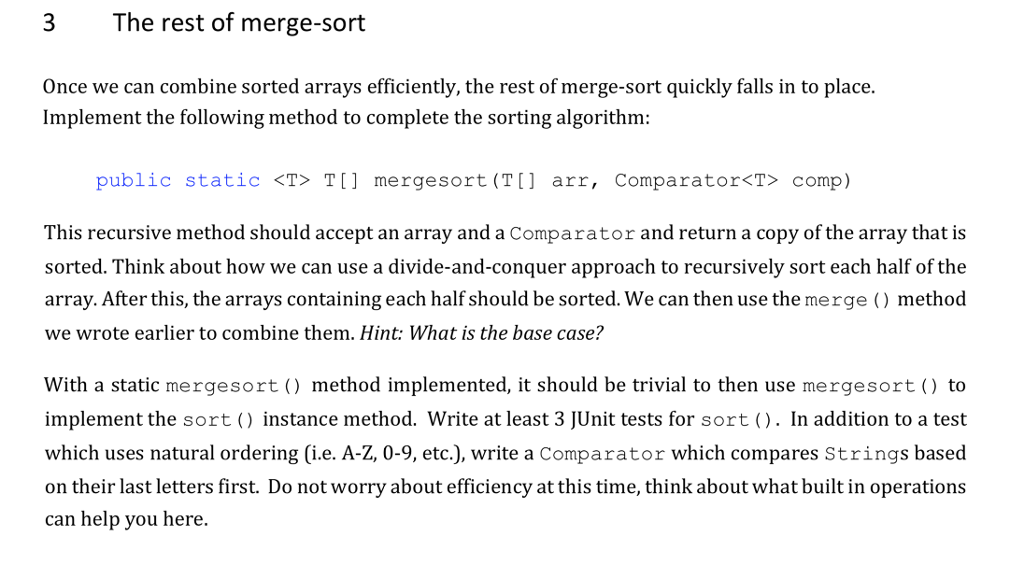Question
please use java. Thanks the previous code is : import java.util.Comparator; import java.util.Iterator; import java.util.NoSuchElementException; import java.util.Random; import java.util.Arrays; public interface ReadonlyList { T get(int
please use java. Thanks
the previous code is :
import java.util.Comparator;
import java.util.Iterator;
import java.util.NoSuchElementException;
import java.util.Random;
import java.util.Arrays;
public interface ReadonlyList{ T get(int index); int size(); Iterator iterator(); }
public class ArrayList
{
private Object[] array;
private int size;
public ArrayList(int capacity)
{
array = new Object[capacity];
}
public int size()
{
return size;
}
@SuppressWarnings("unchecked")
public T get(int index)
{
if (index >= size)
{
throw new IndexOutOfBoundsException("Index: " + index + ", Size: " + size);
}
else
{
return (T) array[index];
}
}
public void set(int index, T value)
{
if (index >= size)
{
throw new IndexOutOfBoundsException("Index: " + index + ", Size: " + size);
}
else
{
array[index] = value;
}
}
private void resize(int newCapacity)
{
Object[] original = array;
array = new Object[newCapacity];
for (int i = 0; i
{
array[i] = original[i];
}
}
public void add(T value)
{
if (size == array.length)
{
resize(size * 2);
}
array[size] = value;
size++;
}
public void addAll(T[] values)
{
for (T v : values)
{
add(v);
}
}
private void shiftRight(int index, int amount)
{
for (int k = size - 1; k >= index; k--)
{
array[k + amount] = array[k];
}
}
public void add(int index, T value)
{
if (index > size)
{
throw new IndexOutOfBoundsException(
"Index: " + index + ", Size: " + size);
}
if (size == array.length)
{
resize(size * 2);
}
shiftRight(index, 1);
array[index] = value;
size++;
}
public void addAll(int index, T[] values)
{
if (index > size)
{
throw new IndexOutOfBoundsException(
"Index: " + index + ", Size: " + size);
}
if (size + values.length > array.length)
{
resize((size + values.length) * 2);
}
shiftRight(index, values.length);
for (int k = 0; k
{
array[index + k] = values[k];
}
size += values.length;
}
public void remove()
{
if (size
{
throw new IllegalStateException("Array is empty, no item to remove!");
}
else
{
size--;
}
}
private void shiftLeft(int index, int amount)
{
for (int k = index; k + amount
{
array[k] = array[k + amount];
}
}
public void remove(int index, int count)
{
if (index + count > size)
{
throw new IndexOutOfBoundsException(
"Index: " + size + ", Size: " + size);
}
else
{
shiftLeft(index, count);
size -= count;
}
}
public static
{
Object[] list=new Object[arr1.length+arr2.length];
int i=0,j=0,k=0;
while(i { if(comp.compare(arr1[i],arr2[j]) list[k++]=arr1[i++]; else list[k++]=arr2[j++]; } while(i while(j return (T[])list; } public void sort(Comparator { for (int i = 1; i { T n = get(i); for (int j = i - 1; j >= 0 && c.compare(n, get(j)) j--) { array[j + 1] = get(j); array[j] = n; } } } public String toString() { if (size == 0) { return "[]"; } else { StringBuilder stringBuilder = new StringBuilder("["); stringBuilder.append(get(0)); for (int i = 1; i { stringBuilder.append(", "); stringBuilder.append(get(i)); } stringBuilder.append("]"); return stringBuilder.toString(); } } public Iterator { return new Iterator { private int i = -1; public boolean hasNext() { return i + 1 } public T next() { if (!hasNext()) { throw new NoSuchElementException(); } i++; return get(i); } }; } public static void main(String[] args) { ArrayList list.addAll(new Double[] { 1.0, 1.5, 2.0, 2.5, 3.5, 4.0, 4.5, 5.0 }); for (int i = 0; i { System.out.println(list.get(i)); } System.out.println(); System.out.println("Using iterator:"); Iterator while (iterator.hasNext()) { System.out.println(iterator.next()); } System.out.println(); System.out.println("Set element 4 to 3.14:"); list.set(4, 3.14); for (int i = 0; i { System.out.println(list.get(i)); } System.out.println(); System.out.println("Insert 9.0 at position 3, and -5.0 at position 0:"); list.add(3, 9.0); list.add(0, -5.0); System.out.println("Insert 0.5, 1.5, 2.5 at position 1:"); list.addAll(1, new Double[] {0.5, 1.5, 2.5}); System.out.println("Insert 99.0 at position 13:"); list.add(13, 99.0); for (int i = 0; i { System.out.println(list.get(i)); } System.out.println(); System.out.println("Remove three elements from the end:"); list.remove(); list.remove(); list.remove(); for (int i = 0; i { System.out.println(list.get(i)); } System.out.println(); System.out.println("Remove six elements at position 2."); list.remove(2, 6); for (int i = 0; i { System.out.println(list.get(i)); } System.out.println(); System.out.println("Expecting exceptions:"); try { System.out.println(list.get(5)); System.out.println("No exception!"); } catch(IndexOutOfBoundsException e) { e.printStackTrace(); } try { list.set(5, 1.0); System.out.println("No exception!"); } catch(IndexOutOfBoundsException e) { e.printStackTrace(); } try { list.add(6, 1.0); System.out.println("No exception!"); } catch(IndexOutOfBoundsException e) { e.printStackTrace(); } try { list.addAll(6, new Double[] {1.0, 2.0, 3.0}); System.out.println("No exception!"); } catch(IndexOutOfBoundsException e) { e.printStackTrace(); } try { list.remove(1, 5); System.out.println("No exception!"); } catch(IndexOutOfBoundsException e) { e.printStackTrace(); } try { System.out.println(list.get(-1)); System.out.println("No exception!"); } catch(IndexOutOfBoundsException e) { e.printStackTrace(); } System.out.println(); System.out.println("Remove all but the first element:"); list.remove(1, 4); for (int i = 0; i { System.out.println(list.get(i)); } System.out.println(); list.remove(); System.out.println("List should be empty:"); System.out.println("size = " + list.size()); System.out.println(); System.out.println("Expecting exception:"); try { list.remove(); System.out.println("No exception!"); } catch(IllegalStateException e) { e.printStackTrace(); } Random random = new Random(); ArrayList for (int i = 0; i { l1.add(random.nextInt(100)); } System.out.println(Arrays.toString(l1.array)); l1.sort(Comparator.naturalOrder()); System.out.println(Arrays.toString(l1.array)); ArrayList for (int i = 0; i { l2.add(random.nextInt()); } l2.sort(Comparator.naturalOrder()); for (int i = 1; i { if (l2.get(i) { System.out.println("FAIL: " + l2.get(i - 1) + ", " + l2.get(i)); return; } } System.out.println("PASS"); } }
Step by Step Solution
There are 3 Steps involved in it
Step: 1

Get Instant Access to Expert-Tailored Solutions
See step-by-step solutions with expert insights and AI powered tools for academic success
Step: 2

Step: 3

Ace Your Homework with AI
Get the answers you need in no time with our AI-driven, step-by-step assistance
Get Started


